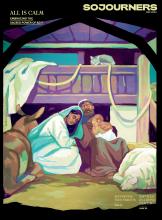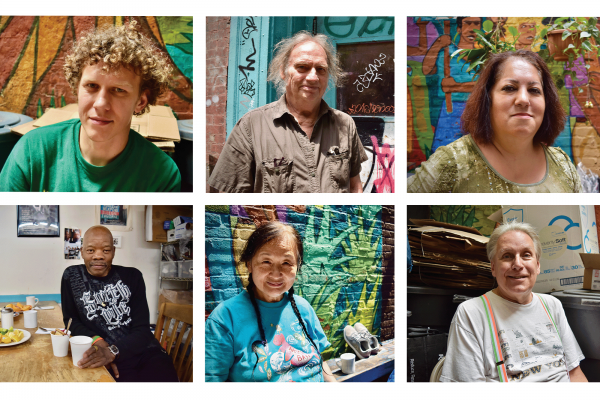“CATHOLIC WORKER” is shorthand for a movement, a place of hospitality, and a one-penny newspaper started by activist visionaries Dorothy Day and Peter Maurin in the early 1930s in New York City. They imagined urban and rural communities where poverty and loneliness could be alleviated by compassion, connection, shelter, and meaningful work rooted in the teachings of Jesus’ Sermon on the Mount. Catholic Workers are also the people who dish soup, pour coffee, sweep floors, and work for peace at more than 100 loosely affiliated Catholic Worker houses around the world.
Kris Brunelli has been involved in Catholic Worker communities since 2011 when she started serving soup in New York City’s East Village. She met her husband, Marcus, while they were live-in volunteers at the Denver Catholic Worker. Now the two live in Harlem and volunteer at two Catholic Worker houses of hospitality: St. Joseph House and Maryhouse. Marcus is one of a dozen St. Joseph Catholic Workers that Brunelli interviewed for this story.
Between the clang of ladles and the splash of dishwater, community is born and reborn each day. Although people experiencing hunger and homelessness come to St. Joe’s for obvious needs, everyone who walks in the doors needs something. “We volunteers need community — need it just as much, if not more, as the guests who come and eat,” Brunelli says. “We would be lonely without it — lost, even.” — The Editors
Hideko
AT 8 IN the morning, my husband and I knock on the graffiti-splattered, candy-blue door. Most Mondays, alongside other St. Joseph Catholic Worker volunteers, we help serve breakfast to roughly 80 people. Since 1968, off First Street and Second Avenue in the East Village, people have found community.
“Come in! Come in!” Hideko says.
Five feet tall, a black braid down her back, she smiles over her shoulder. “The boss” several days a week, Hideko asks if we want to help make sandwiches — and heads back to the door when someone else knocks.
She stays busy. Originally from Japan, she’s worked on the Japanese translation of Keeanga-Yamahtta Taylor’s 2021 edition of From #BlackLivesMatter to Black Liberation, as well as for Democracy Now! Japan, and regularly organizes protests against U.S. military bases in Okinawa. She is “stubborn.” She says, “you have to be to do this work.”
Read the Full Article

